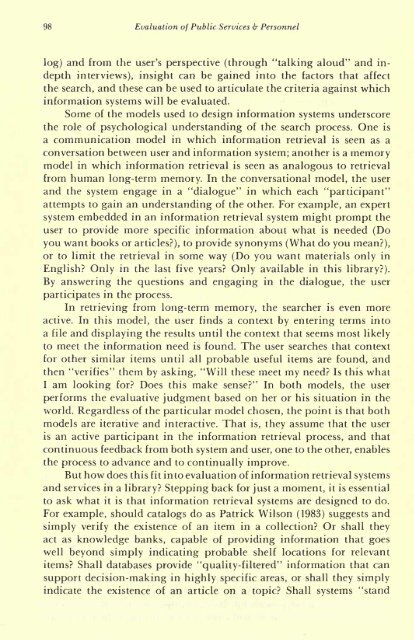User-Centered Evaluation of Information Retrieval - ideals
User-Centered Evaluation of Information Retrieval - ideals
User-Centered Evaluation of Information Retrieval - ideals
You also want an ePaper? Increase the reach of your titles
YUMPU automatically turns print PDFs into web optimized ePapers that Google loves.
98 <strong>Evaluation</strong> <strong>of</strong> Public Services fr Personnel<br />
log) and from the user's perspective (through "talking aloud" and indepth<br />
interviews), insight can be gained into the factors that affect<br />
the search, and these can be used to articulate the criteria against which<br />
information systems will be evaluated.<br />
Some <strong>of</strong> the models used to design information systems underscore<br />
One is<br />
the role <strong>of</strong> psychological understanding <strong>of</strong> the search process.<br />
a communication model in which information retrieval is seen as a<br />
conversation between user and information system; another is a memory<br />
model in which information retrieval is seen as analogous to retrieval<br />
from human long-term memory. In the conversational model, the user<br />
and the system engage in a "dialogue" in which each "participant"<br />
attempts to gain an understanding <strong>of</strong> the other. For example, an expert<br />
system embedded in an information retrieval system might prompt the<br />
user to provide more specific information about what is needed (Do<br />
you want books or articles?), to provide synonyms (What do you mean?),<br />
or to limit the retrieval in some way (Do you want materials only in<br />
English? Only in the last five years? Only available in this library?).<br />
By answering the questions and engaging in the dialogue, the user<br />
participates in the process.<br />
In retrieving from long-term memory, the searcher is<br />
active. In this model, the user finds a context by entering<br />
even more<br />
terms into<br />
a file and displaying the results until the context that seems most likely<br />
to meet the information need is found. The user searches that context<br />
for other similar items until all probable useful items are found, and<br />
then "verifies" them by asking, "Will these meet my need? Is this what<br />
I am looking for? Does this make sense?" In both models, the user<br />
performs the evaluative judgment based on her or his situation in the<br />
world. Regardless <strong>of</strong> the particular model chosen, the point is that both<br />
models are iterative and interactive. That is, they assume that the user<br />
is an active participant in the information retrieval process, and that<br />
continuous feedback from both system and user, one to the other, enables<br />
the process to advance and to continually improve.<br />
But how does this fit into evaluation <strong>of</strong> information retrieval systems<br />
and services in a library? Stepping back for just a moment, it is essential<br />
to ask what it is that information retrieval systems are designed to do.<br />
For example, should catalogs do as Patrick Wilson (1983) suggests and<br />
simply verify the existence <strong>of</strong> an item in a collection? Or shall they<br />
act as knowledge banks, capable <strong>of</strong> providing information that goes<br />
well beyond simply indicating probable shelf locations for relevant<br />
items? Shall databases provide "quality-filtered" information that can<br />
support decision-making in highly specific areas, or shall they simply<br />
indicate the existence <strong>of</strong> an article on a topic? Shall systems "stand
















